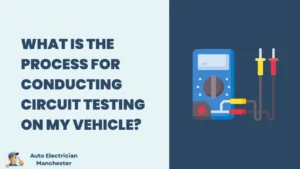
Car electrical problems can be a motorist’s nightmare, leaving you stranded or facing a baffling array of malfunctions. Fear not! Circuit testing emerges as a powerful tool in your arsenal, enabling you to diagnose these issues with precision and pinpoint the exact culprit.
Electrical Mischief with a Multimeter
At the heart of circuit testing lies the trusty multimeter, your window into a car’s electrical soul. This versatile tool empowers you to measure three key electrical properties within a circuit: voltage, current, and resistance. By comparing these readings to your car’s wiring diagrams (often obtainable online or from repair manuals), you can unveil hidden electrical gremlins.
Deviations from the expected values can signal a failing component drawing excessive current, or a bad connection introducing unwanted resistance, hindering the smooth flow of electricity.
For instance, a consistently low voltage reading on a circuit supplying power to your headlights might indicate a failing battery or a corroded connection somewhere along the wiring harness.
Identifying Circuit Continuity Issues
Circuit testing can also shed light on two critical circuit conditions: open circuits and short circuits.
An open circuit essentially represents a break in the electrical wiring, acting like a roadblock that disrupts the flow of electricity. Imagine a garden hose with a kink – water flow ceases just like current flow halts in an open circuit.
Your multimeter, when set to the continuity testing function, acts like a detective searching for a missing link. It sends a tiny electrical current through the circuit and checks for its successful completion. If the current encounters an open circuit, the multimeter won’t register a complete path, indicating a break in the wiring that needs your attention.
On the other hand, a short circuit presents the opposite scenario. Here, unwanted contact occurs between wires that aren’t supposed to touch. Imagine accidentally crossing two bare wires in your garden hose – water shoots out uncontrollably, similar to how a short circuit allows uncontrolled current flow, which can lead to malfunctions and even fire hazards.
Circuit testing can help identify such shorts by measuring abnormally low resistance between points in the circuit that shouldn’t have a direct connection.
Solid Electrical Foundation
A car’s electrical system relies heavily on a proper ground connection, much like a building needs a solid foundation. This ground connection acts as a reference point for the entire electrical system.
Circuit testing empowers you to ensure this vital connection is functioning correctly. If you encounter low voltage readings at a specific component, even with a known good power source, it could indicate a weak ground connection. By testing the voltage between the component’s ground and a known good ground (often the car’s chassis), you can diagnose a faulty ground and take corrective measures.
Targeted Diagnosis
Circuit testing offers a significant advantage – it allows for targeted diagnosis. By isolating specific circuits related to a malfunctioning component, like headlights or windows, you can effectively narrow down the problem area.
Imagine your car’s radio having issues – instead of spending hours inspecting the entire electrical system, circuit testing allows you to focus on the radio’s power supply circuit. This targeted approach saves you time and effort compared to a scattershot inspection of the entire wiring harness.
Empower Yourself, But Know When to Seek Help
It’s important to acknowledge that circuit testing can become increasingly complex, especially in modern cars with intricate wiring systems. Consulting a repair manual specific to your car model is a valuable resource, providing detailed wiring diagrams and component specifications.
For tackling complex electrical issues or situations where you’re unsure of the next step, don’t hesitate to seek professional help from a qualified mechanic. A skilled technician can leverage advanced diagnostic tools and their expertise to resolve the problem efficiently.
Remember, circuit testing equips you to tackle common electrical problems, empowering you to take charge of your car’s well-being and get back on the road with confidence!
Final Words
By equipping yourself with knowledge and the right tools, circuit testing empowers you to address common electrical concerns and keep your car running smoothly. Remember, when the problem sparks beyond your comfort zone, don’t hesitate to call in the experts!
FAQ
Can I fix car electrical problems myself?
In many cases, yes! Circuit testing can help you diagnose the problem and potentially fix it yourself, particularly for common issues like a blown fuse. However, for complex problems or if you’re uncomfortable with electrical work, seeking professional help is always a safe bet.

David Mack is a seasoned writer with a passion for the auto electrician niche. With years of hands-on experience and a knack for demystifying complex topics, David brings practical insights to his readers. Whether you’re a professional or a car enthusiast, his engaging articles offer valuable tips and trends in auto electrical systems.
